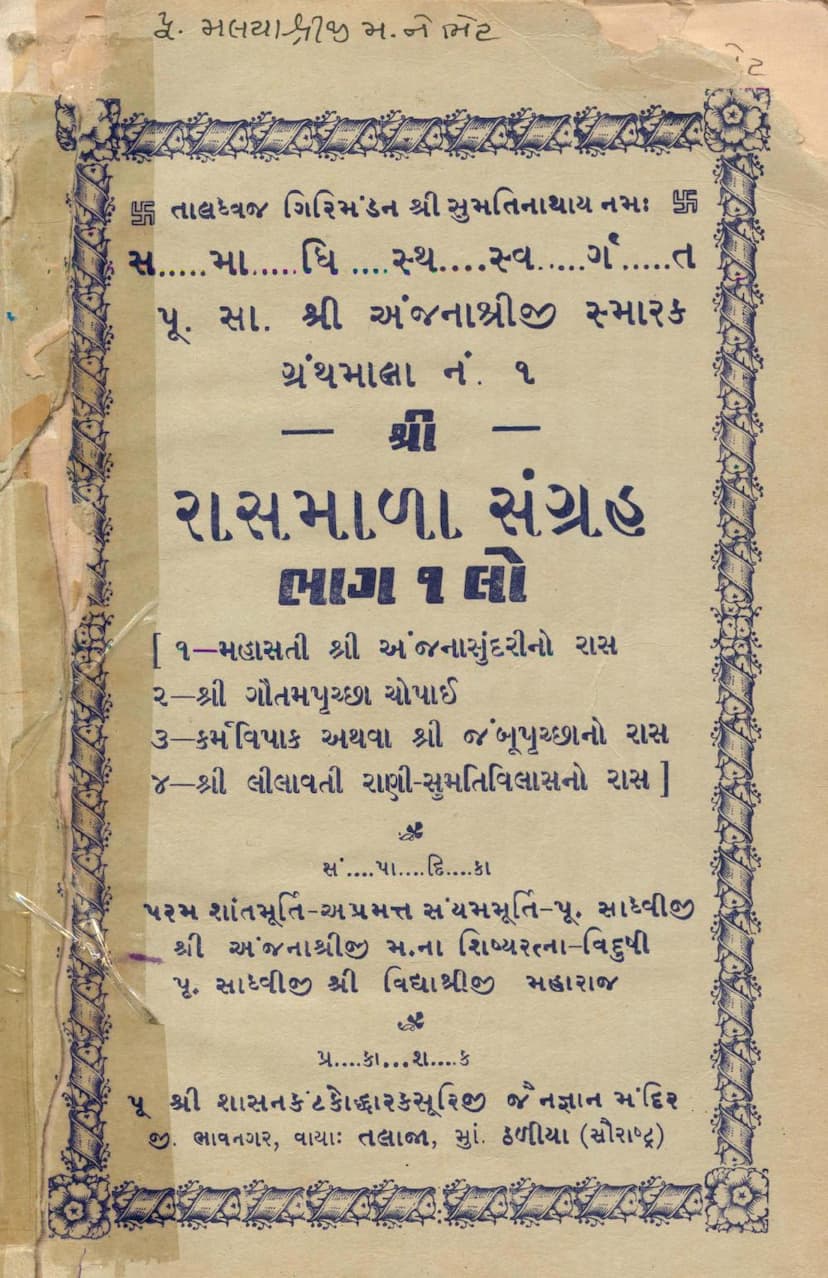Rasmala Sangraha
Added to library: September 2, 2025

Summary
This document is a Jain religious text titled "Rasmala Sangraha" (Collection of Raas – devotional songs or narratives), compiled and published by the Shasan Kantakoddharksuri Jain Gyanmandir. The text is dedicated to the memory of Pujya Sadhvi Shri Anjanashriji Maharaj, a respected Jain nun known for her long spiritual practice, peaceful demeanor, and disciplined life.
The collection, Volume 1, features four important Raas compositions:
- Mahasati Shri Anjana Sundari no Raas: A devotional narrative about the virtuous Jain saint Anjana Sundari.
- Shri Gautam Prichchha Chopai: A composition detailing the questions posed by Gautam Swami (a disciple of Lord Mahavir) and the answers given by Lord Mahavir.
- Karmavipak athva Shri Jamboo Prichchha no Raas: A narrative that explores the consequences of actions (karma) or the questions posed by Jamboo Swami.
- Shri Lilavati Rani-Sumati Vilas no Raas: A story about Queen Lilavati and Prince Sumati Vilas, likely detailing their lives and spiritual journey.
The compiler of this collection is Pujya Sadhvi Shri Vidyashreeji Maharaj, a disciple of the late Pujya Anjanashriji Maharaj, renowned for her scholarship and spiritual dedication.
The preface highlights the importance of preserving ancient Jain literature, particularly the "Raas" form which was prevalent from the 15th to 20th centuries in Gujarati vernacular. This literature, composed by venerable monks and scholars, makes the lives and teachings of enlightened beings accessible to a wider audience who may not be fluent in Sanskrit or Prakrit. The text also notes that while much literature has been published, a significant portion remains unpublished and in deteriorating condition, necessitating its preservation and dissemination.
The publication aims to honor the legacy of Pujya Anjanashriji Maharaj by bringing forth these ancient Raas compositions, enriching them with scholarly annotations and cross-references to original manuscripts to ensure accuracy and clarity. The introduction emphasizes the meticulous effort involved in preparing these Raas collections, making this publication a significant contribution to Jain literature and devotional practice.
The text includes detailed biographical information about Pujya Sadhvi Shri Anjanashriji Maharaj, including her birth, renunciation (initiation), and passing away, along with her dedication to spiritual practices and service to the Jain community. It also provides insights into the authors and historical context of each Raas included in the volume, mentioning the centuries in which they were composed and their lineage of scholars.
The latter part of the document contains the actual Raas compositions, presented in Gujarati verse. These narratives recount stories of virtuous individuals, their spiritual endeavors, and the principles of Jainism, offering moral and devotional guidance. The Raas of Anjana Sundari, in particular, is extensively detailed, covering her life, challenges, faith, and ultimate liberation. The other Raas compositions also delve into philosophical and ethical themes relevant to Jain teachings.
The document concludes with acknowledgments and details about the publication, including its price and where it can be obtained from the Shasan Kantakoddharksuri Jain Gyanmandir. It also highlights the dedication of the publishing institution and the contributing scholars in making this valuable collection available to the public.